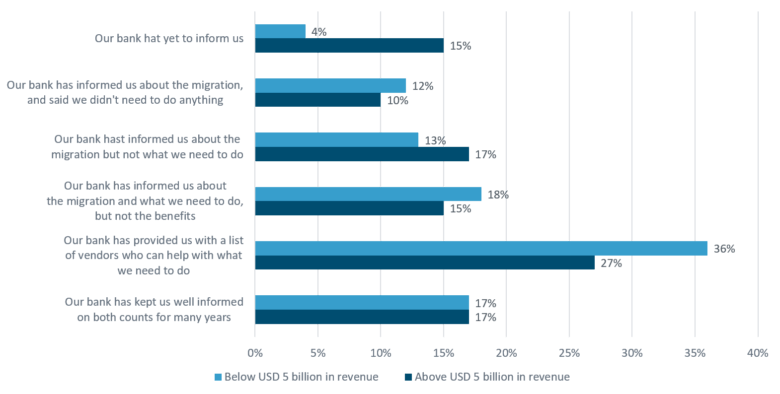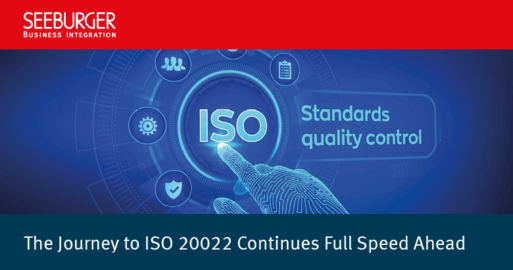Unlocking Competitive Opportunities With ISO 20022

The impending migration to ISO 20022 is changing the global payments landscape dramatically. In order to stay ahead of the curve, banks need to be proactive in adopting the new messaging standard to realize the new opportunities for growth and efficiency it has to offer. Most importantly, it provides a common basis that will help to enable global business transactions, reduce costs, increase efficiencies and unlock new competitive opportunities. However, banks are not the only ones affected by the ISO 20022 migration. In order for them to reap the benefits, their corporate customers need to be as ready as they are. But are they? This blog looks at some of the key findings from a joint survey by SEEBURGER and leading global analyst firm Celent on the readiness of both banks and corporates for ISO 20022.
Why is ISO 20022 relevant for banks’ corporate customers?
While financial institutions in the SWIFT network have to complete the migration to the new standard by November 2025, no such deadline exists for corporates. But that does not mean that they don’t need to act:
- Thirty-two percent of the global corporates polled said they expected their banks to shield them from any negative impacts of the migration. It is generally expected that many, and certainly the larger, banks will continue to support their clients’ older systems for the time being. Less clear is what the price for this protection will be. Banks may leverage fees for conversion services, and given that most corporates are multi-banked, fees could add up quickly. What’s more, the financial industry will certainly be keeping a close eye on what line SWIFT is taking and act accordingly. Whenever their banks stop supporting MT, corporates need to be ready.
- SWIFT’s timeline for the migration has so far proven to be fairly flexible and is expected to remain so in the future. However, SWIFT still projects that once the banks have migrated to the new standard by fall of 2025, corporations will then embark on the same journey. Once their migration has been accomplished, the old messaging formats will be retired. Any corporate, no matter how small, that has not moved to the new standard at this point will be unable to do business with its banks, meaning it will be unable to do business, period.
But it’s not all dire. The benefits of ISO 20022 as a key enabler of competitiveness for corporates are equally clear. The new standard will enable them to streamline their operations, reduce costs, and improve visibility and control over their financial transactions while simultaneously increasing security. ISO 20022 will be understood across all geographies and jurisdictions as a single standard.
ISO 20022 – the corporate view
As the payment industry is gearing up for the adoption of ISO 20022, corporates are also facing a massive challenge in being able to understand and implement this new standard. With the globalization of financial services, corporates need to be aware of how ready they are for the transition. But they can only be ready for something they know about.
Alarmingly, 15% of global corporates with revenues above USD 5 billion said their bank had yet to inform them of the impending change. Another 15% stated that their bank had informed them of the migration itself, but not of the benefits it would have for them. There seems to be a tendency among some banks to regard ISO 20022 as a “bank thing,” something that for the time being only affects their clients tangentially. A positive takeaway is the large number of banks who have understood the importance of informing their corporate clients as well as providing them with options for outside support.

Source: Celent Global ISO 20022 Readiness Survey, 2022
On the whole, banks are fairly optimistic about the migration, with 58% of global banks believing that the industry will be at least 75% ready by the final deadline. Perhaps one of the most surprising results of the survey, however, was that corporates do not share this rosy view, with 76% of corporates with revenues under USD 1 billion believing that most banks will not be ready. And many of them are already preparing for the worst-case scenario.
Globally, 10% of corporates said they were doubtful whether their banks would be ready in time and are making contingency plans in case they aren’t. Four percent of corporates in the Asia Pacific region even said they don’t believe their banks will be ready, and will swap to a bank that is. Given that most corporates work with multiple banks, they may actually have the clearer idea of the industry’s level of readiness than banks.
Here’s why banks should care about corporate readiness
The move to ISO 20022 is an immensely painful process for banks, who need to integrate 21st century business requirements into systems that are up to 40 years old and were never meant to hold such massive amounts of data. Given the scope of the challenge ahead of them, it is perhaps understandable that they are primarily focusing on their own challenges.
But the new messaging standard is a two-edged sword. Just as a telephone is useless unless the person you’re trying to call also has one, it won’t matter how ready banks are if their corporate customers are not. Both sides need to be able to receive and send the wealth of payment data that ISO 20022 offers, or it will be truncated and lost. If banks want to leverage the opportunities the new standard has to offer and reap the benefits, it is mission-critical for them to get their customers ready, too. Through their close business relationships, banks are in a unique position to help their corporate clients understand the mutual benefits ISO 20022 has to offer.
Instead of being a challenge for financial services, banks should consider it a mutual business opportunity for themselves and their corporate clients alike. By helping corporates transition to the new ISO 20022 standard, banks can improve efficiency, reduce costs, build new business models and help their clients take advantage of new opportunities.
What are the benefits for banks of educating their corporate customers about ISO 20022?
The use of ISO 20022 offers a range of benefits for both banks and their corporate customers. For banks, the most obvious benefit is that it provides an efficient and cost-effective way to process payments and reconcile accounts. By using ISO 20022, banks can reduce operational costs, improve data accuracy and fraud prevention and increase the speed at which transactions are settled. Additionally, the use of this standard can help banks to stay competitive by allowing them to offer their corporate customers the latest payment options and services.
For corporate customers, ISO 20022 offers heightened visibility into their banking activities. This means that they can access up-to-date information about their accounts more quickly and easily, which helps them make better decisions about their finances. Additionally, by adopting this standard, corporations can enjoy a more streamlined payment process with fewer errors and less manual intervention.
By educating their corporate customers about ISO 20022, banks will be able to capitalize on these benefits while helping their customer base become more informed and efficient in their banking operations. This can lead to stronger customer relationships and trust, as well as increased loyalty from clients who understand how the technology works to their advantage. In turn, this could result in higher revenues for the bank as well as greater market share in the competitive banking industry.
How SEEBURGER helps
At SEEBURGER, we have worked with some of the world’s top banks for many years and gained deep insight into the inner workings of their core systems and applications. This has given us an intimate understanding of what their business needs are, how data has to be integrated and managed and what challenges banks face when migrating to new infrastructure and creating new services. With this knowledge, we are uniquely positioned to help make your transition as smooth and successful as possible.
Technical Whitepaper
ISO 20022: Create a Better Payment Experience Across All Channels with a Modern Payments Integration Hub
DownloadThank you for your message
We appreciate your interest in SEEBURGER
Get in contact with us:
Please enter details about your project in the message section so we can direct your inquiry to the right consultant.
Written by: Ulf Persson
As SVP Strategic Product Management and Analyst Relations, Ulf is responsible for strategic product management, product marketing, global analyst relations and leadership with regards to SEEBURGER integration technology, platform and integration services. This also includes strategic sales and marketing initiatives. Ulf works across multiple industry verticals such as Financial Services/Payments, Automotive, Logistics, Utilities, Retail, CPG and Manufacturing. Ulf has more than 30 years of global business and technology experience working with product and solution delivery of integration technologies (EAI, EDI, B2B, MFT, API, etc.), Analytics and Big Data, Cloud Services, Digital Transformation and various industry initiatives. Before joining SEEBURGER in October 2016, Ulf worked in various global leadership roles with international business integration technology and cloud services providers.





